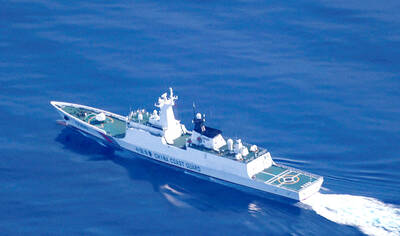Former Peruvian president Alberto Fujimori was convicted of embezzlement and sentenced to seven-and-a-half years in prison on Monday after he admitted illegally paying his spy chief US$15 million in government funds.
Fujimori sat expressionless in front of the three-judge panel as the verdict and sentence were read. He told the court he would seek to nullify the ruling.
The conviction is the third in less than two years for the ex-leader. He was sentenced in April to 25 years in prison for authorizing military death squads during his 10-year rule. Earlier, he was convicted of abuse of power and sentenced to six years for an illegal search.
Peruvian prison sentences do not accumulate, so 25 years is the maximum term the 70-year-old Fujimori can serve.
Last week, Fujimori acknowledged making the irregular payment to intelligence chief Vladimiro Montesinos, but he said he should not be held criminally responsible because he later repaid it with money found in the headquarters of Montesinos’ feared agency.
By acknowledging the payoff, Fujimori avoided a drawn-out trial that could damage his daughter’s candidacy for the 2011 presidential election. Keiko Fujimori has said she will pardon her father if she wins.
During a spirited defense on Friday that critics called a campaign speech for his daughter, Fujimori said he was obligated to make the payment to avoid a military coup plotted by Montesinos.
“The true judgment for me is that of the people, who have long absolved me in their hearts,” Fujimori said.
The former president still enjoys some popularity for neutralizing Shining Path guerrillas that nearly toppled the government, but a series of recent trials have tied him to corruption and human rights abuses.
During his defense, Fujimori said his previous convictions and the embezzlement case were politically motivated, and he did not expect to find justice in court.
Presiding Judge Cesar San Martin opened the hearing on Monday by denying any political intent.
Fujimori faces yet another trial on allegations that he authorized illegal phone taps and congressional bribes and that he used state funds to purchase a television station to air political propaganda.
As his government was collapsing in 2000 after a videotape surfaced showing Montesinos bribing a congressman, Fujimori signed an executive order transferring US$15 million to the Defense Ministry to defend against a supposed incursion of Colombian rebels in Peru.
The court ruled the money was handed over to Montesinos, who moved it to foreign bank accounts and fled for Panama.
Montesinos is now serving a 20-year term for bribing lawmakers and businessmen and selling weapons to Colombian rebels.
Prosecutors dispute Fujimori’s claim that he found US$15 million in Montesinos’ intelligence agency 41 days after the illegal payoff and have called for a separate investigation.
The court also ruled that Fujimori must join three former Cabinet ministers in contributing to a US$1 million reparations payment to the government.

LANDMARK CASE: ‘Every night we were dragged to US soldiers and sexually abused. Every week we were forced to undergo venereal disease tests,’ a victim said More than 100 South Korean women who were forced to work as prostitutes for US soldiers stationed in the country have filed a landmark lawsuit accusing Washington of abuse, their lawyers said yesterday. Historians and activists say tens of thousands of South Korean women worked for state-sanctioned brothels from the 1950s to 1980s, serving US troops stationed in country to protect the South from North Korea. In 2022, South Korea’s top court ruled that the government had illegally “established, managed and operated” such brothels for the US military, ordering it to pay about 120 plaintiffs compensation. Last week, 117 victims

‘HYANGDO’: A South Korean lawmaker said there was no credible evidence to support rumors that Kim Jong-un has a son with a disability or who is studying abroad South Korea’s spy agency yesterday said that North Korean leader Kim Jong-un’s daughter, Kim Ju-ae, who last week accompanied him on a high-profile visit to Beijing, is understood to be his recognized successor. The teenager drew global attention when she made her first official overseas trip with her father, as he met with Chinese President Xi Jinping (習近平) and Russian President Vladimir Putin. Analysts have long seen her as Kim’s likely successor, although some have suggested she has an older brother who is being secretly groomed as the next leader. The South Korean National Intelligence Service (NIS) “assesses that she [Kim Ju-ae]

In the week before his fatal shooting, right-wing US political activist Charlie Kirk cheered the boom of conservative young men in South Korea and warned about a “globalist menace” in Tokyo on his first speaking tour of Asia. Kirk, 31, who helped amplify US President Donald Trump’s agenda to young voters with often inflammatory rhetoric focused on issues such as gender and immigration, was shot in the neck on Wednesday at a speaking event at a Utah university. In Seoul on Friday last week, he spoke about how he “brought Trump to victory,” while addressing Build Up Korea 2025, a conservative conference

China has approved the creation of a national nature reserve at the disputed Scarborough Shoal (Huangyan Island, 黃岩島), claimed by Taiwan and the Philippines, the government said yesterday, as Beijing moves to reinforce its territorial claims in the contested region. A notice posted online by the Chinese State Council said that details about the area and size of the project would be released separately by the Chinese National Forestry and Grassland Administration. “The building of the Huangyan Island National Nature Reserve is an important guarantee for maintaining the diversity, stability and sustainability of the natural ecosystem of Huangyan Island,” the notice said. Scarborough